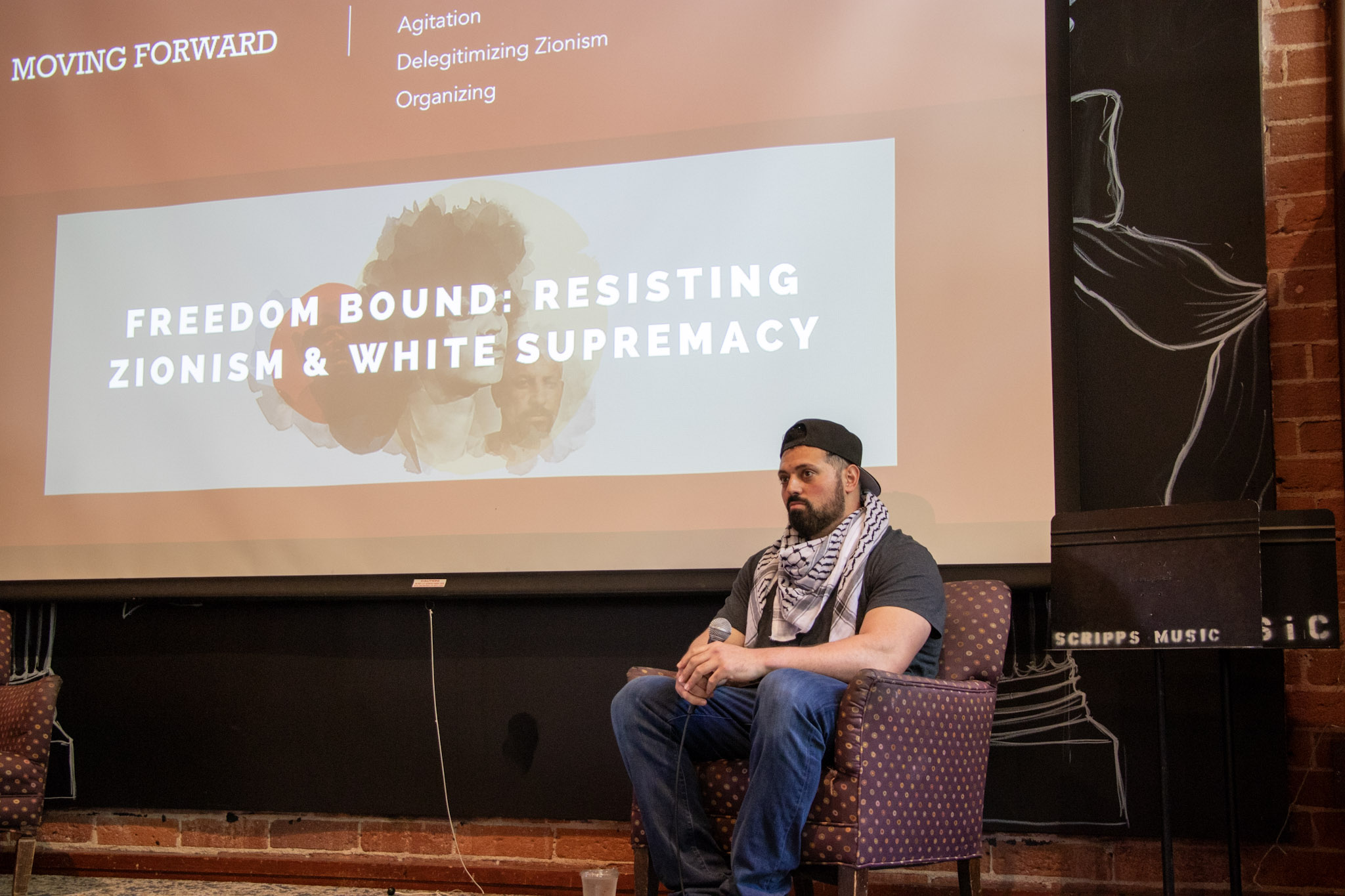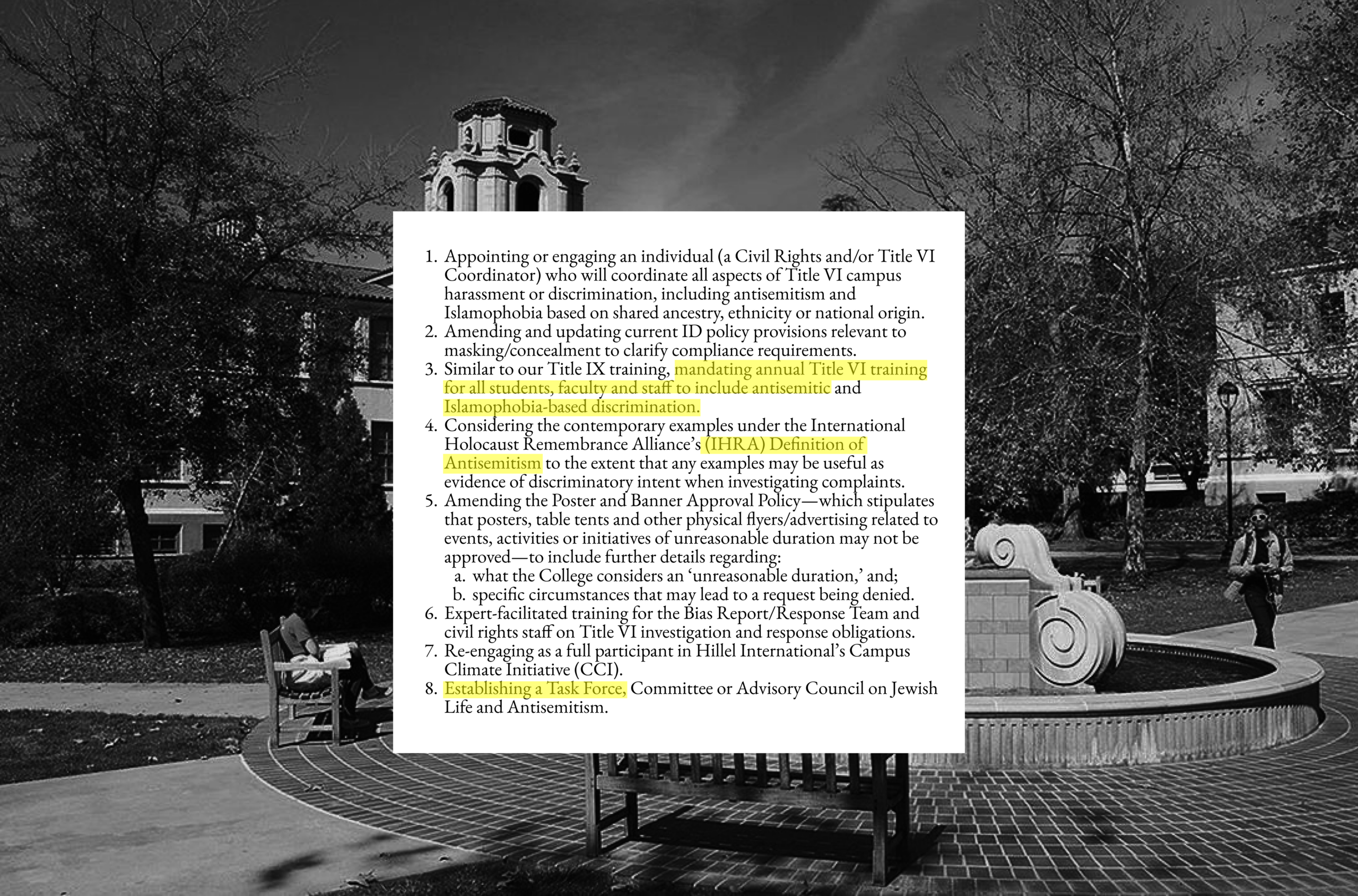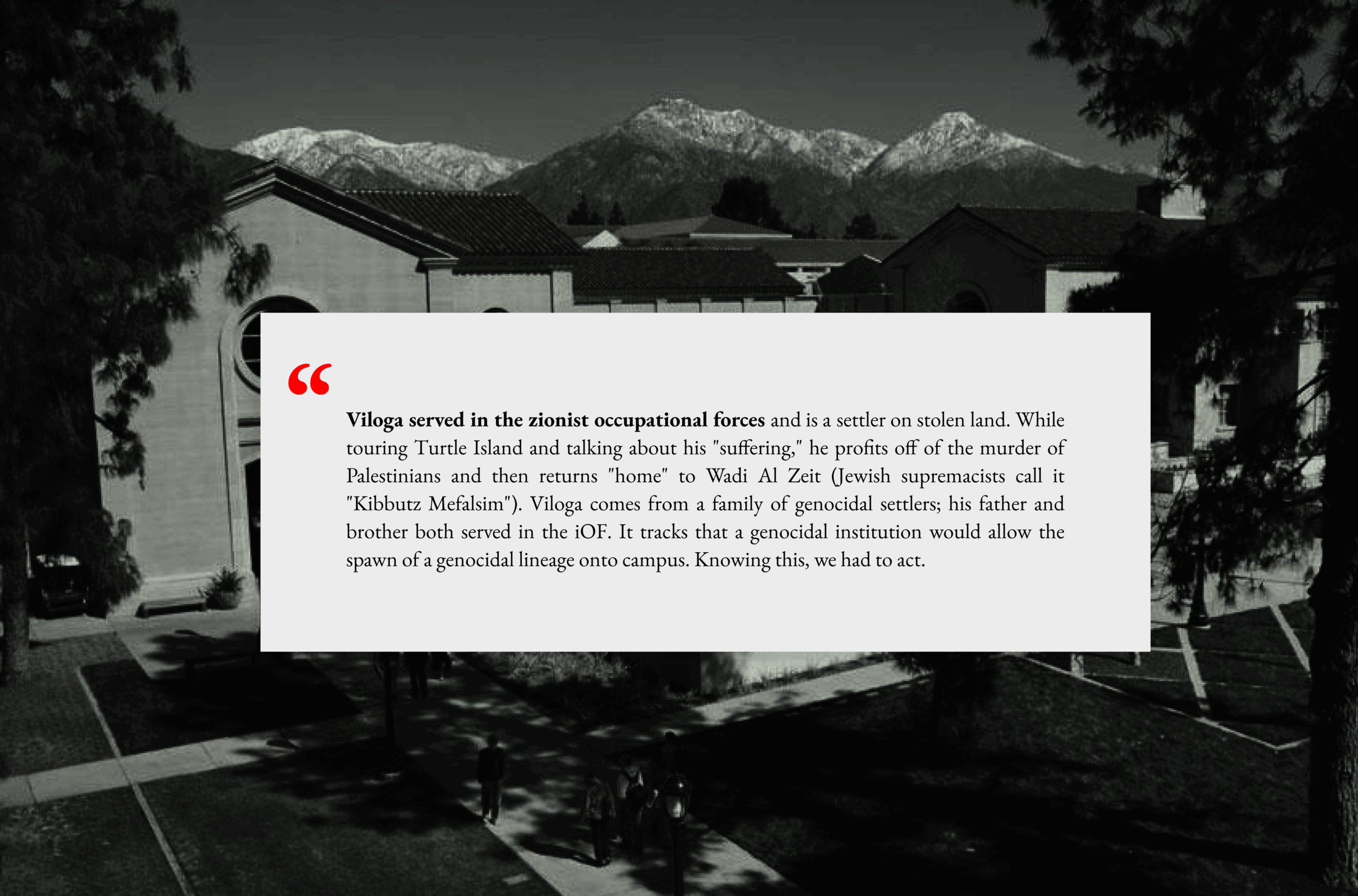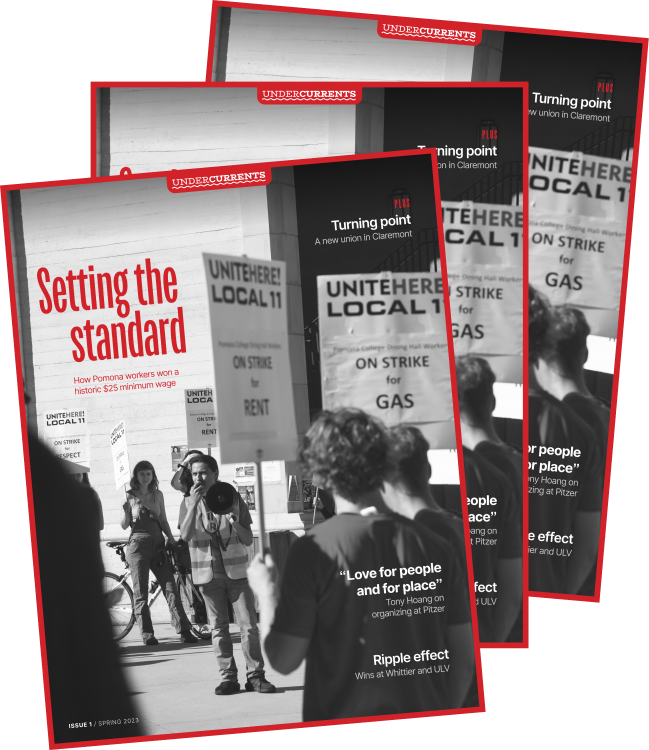
October 22, 2025
Nassar, who was part of the “Irvine 11,” talked about how students can continue to better organize themselves against Zionism and white supremacy.

On Tuesday, Oct. 7, 150 students welcomed Shaheen Nassar at the Motley Coffeehouse on the two year anniversary of the Zionist entity’s intensified genocide on Gaza. Nassar is a Palestinian Muslim organizer who was part of the “Irvine 11” — a group of UC Irvine students who faced criminal charges for disrupting an Israeli ambassador’s talk on campus in 2010. In his talk, Nassar discussed his experience at UC Irvine as a student activist, strategies for organizing long-term movements, as well as the importance of community unity and resilience.
The 7C South West Asian North African club (SWANA) and 16+ other student organizations organized and directed the talk with Nassar, one of three events held that day in remembrance of Oct. 7.
Nassar began his presentation by starting a passionate and moving chant with the crowd of students, stating, “Free, Free Palestine! Long Live Palestine!” which vibrated within the packed coffeehouse. He followed by explaining how the visible presence of Palestinians is a representation of survival and perseverance against oppression.
“[W]e are..reminders, relics, tokens, souvenirs of one of the greatest crimes in modern history, which has recently escalated and culminated into the genocide of our people,” he said.
Nassar went on to explain how the Palestinian death count is at an unimaginable high volume, growing at a speed too fast to accurately number or mourn.
“The genocidal entity has not given an opportunity for the Palestinians to mourn their dead, to bury their dead, to excavate their dead. And so there are all kinds of numbers [of the death count] that are circulating, some as high as 680,000 people have been slaughtered in Gaza, roughly a third of the entire population,” Nassar said.
The Zionist entity’s genocide in Gaza is one of many forms of oppression that feeds into white supremacy and colonialism. Nassar argued that the fight for the people in Gaza must be a part of ending all oppressive systems.
“[Wh]ether the genocide finishes tomorrow, we ensure that this genocidal and apartheid entity [will] collapse under our collective strength,” Nassar said.
While Hamas and the Zionist entity agreed to a ceasefire on Oct. 10, the Zionist entity has continued to attack Gaza, killing almost 100 Palestinians since the ceasefire went into effect.
Nassar went on to explain how symbolic activism in the West, such as posting on social media, has initiated an international solidarity movement with Palestine. However, he also argued that this movement shouldn’t simply be symbolic, but instead translate into effective actions.
“[W]e have to continue to push forward until those symbolic gestures manifest in concrete actions against Israel, [until] the[y] manifest in terms of arms embargoes, manifest in the forms of sanctions against the state, manifest in completely desisting from any trade with that ethnic cleansing entity,” Nassar said.
Nassar also highlighted how people discontinue their activist work after attending protests and using public space as an outlet to create a spectacle.
“Unfortunately, some of these people who are drawn to these protests, they get out, they shout, they create a public spectacle,” Nassar said. “However, sometimes it ends at that. They feel that their rage, their outrage, has dissipated after they get it out of their system. [While] I think public protest is important, and I think it undermines this sort of hegemonic control of American mainstream media… However, our actions cannot be limited to that.”
Instead, Nassar argued that activism work should not end at protests.
“I want you to continue disrupting, agitating, challenging,” Nassar said. “I’m not one for electoral politics, but I do wanna say that if we come from an understanding of inherent skepticism of this system that was premised on white supremacy, that was premised on patriarchy, that was premised on misogyny and violence against marginalized communities, if we understand it from that lens, I think we can leverage some political pressure.”
Nassar explained that this can be done by pressuring politicians through funding, votes and shaming in order to do what is right for the people.
“[Since politicians are] motivated by votes and they’re motivated by funding, we can squeeze them, we can put pressure on them, we can shame them publicly for endorsing genocide. And I think there’s certain select politicians that are a little bit squeamish, that are cowardly by nature and can be pushed reluctantly into doing the right things by exercising our organizing strength. A combination of a two-pronged approach with limited diplomacy and a whole lot of pressure,” he said.
Nassar also clarified how taking care of oneself while doing activist work is not selfish, but rather extremely important because activism is a lifetime effort. He used the example of defeating apartheid in South Africa to illustrate how activism must be long-term.
“We have to balance our activism with our own personal lives, we have to understand that taking care of ourselves so that we can live to fight another day is not an act of self-indulgence,” Nassar said. “It took hundreds of years of colonization, enslavement, and dispossession of the indigenous population of South Africa to form the African National Congress in the early 20th century. And it took another century for that movement to finally defeat apartheid in South Africa. So we’re in it for the long run.”
Nassar then explained how activism during college can be contradictary, as it is a space where young people often learn about resistance, yet it is also the place that conditions them to not fall out of line in society.
“The academy is a double-edged sword. It is both the bastion of resistance and at the same time where consent is manufactured. And so, I want you to understand that there is an active attempt to separate undergraduate students from graduate students, graduate students from faculty, faculty, from the broader community.”
Later on, Nassar was asked a question from a student in the crowd as to how to approach the academy when it inherently allows space to debate whether genocide and ethnic cleansing is right or wrong.
Nassar answered, “the function of dialogue is to facilitate compromise. Now, what compromise are we trying to achieve with the subject of debate? … What’s being debated with these is the humanity of Palestinians. And my answer to that unequivocally is that Palestinian humanity is non-negotiable. It is absolute, and it’s a hill I’m willing to die on. It is not up for discussion and any argument that centers questioning our humanity or our equality is illegitimate and not a conversation that we should be a part of, but something that requires confrontation.”
Nassar went on to encourage attendees to create connections and emphasized the importance of community.
“Start seeking out faculty who have the courage to speak out. Start seeking graduate students, cultural institutions, the mosques, the churches, even anti-Zionist, Jewish collectives, and anyone with a conscience that is willing to build and to be part of this movement. Because ultimately, community is the vehicle of change,” he said.
Nassar also talked about the Zionist ideology as one of racial hierarchy and colonial theology.
“Zionism dehumanizes Palestinians through a racial hierarchy that’s based on cultural identity or religious affiliation,” Nassar said. “And it’s a sort of a colonial theology, similar to manifest destiny, that God has sanctioned the genocide of our people, that God has set Palestinians to die for the sins of Europe.”
He used a quote from University of Connecticut professor Nelson Maldonado-Torres to encapsulate how this colonization theology operates.
“‘The notion of God is crucial for understanding empire, not only because God is necessary to provide recognition to imperial man, but more significantly because empire itself may be taken as man’s most consistent attempt to be God,’” Nassar quoted.
When a student from the crowd asked Nassar what the duty Muslim students have to activism within their university is, Nassar explained that they have the responsibility to oppose all forms of injustice.
“Muslims have had a history of challenging tyranny, of challenging oppressors,” Nassar said. “There was a famous mantra [at a] students of color conferences, ‘all our ancestors fought colonizers.’ That is the mantra that forms the rhythm to which my heart beats. So I think we come from a warrior tradition that is inherently in opposition towards oppression, towards tyranny, towards any supremacist institution that brings harm to people collectively.”
He then ended his talk by explaining how Palestinians are resilient fighters for their freedom against Israel.
“Our people have refused to yield, and they refuse to submit to anything, including this attempt in which supremacists attempt to deify themselves relative to the colonized. I want you to marvel at the power and the strength of the people who will one day very soon destroy this colonial entity and replace it with just an equitable system for all,” Nasser concluded.


Commentary

Palestine

Palestine

Undercurrents reports on labor, Palestine liberation, prison abolition and other community organizing at and around the Claremont Colleges.

Issue 1 / Spring 2023
Setting the Standard
How Pomona workers won a historic $25 minimum wage; a new union in Claremont; Tony Hoang on organizing
Read issue 1